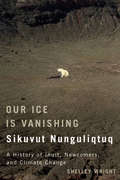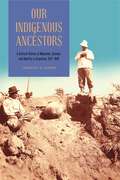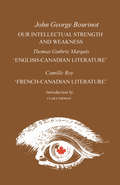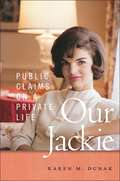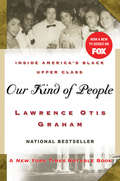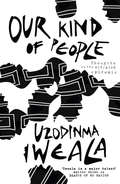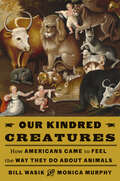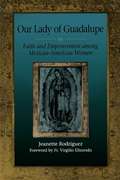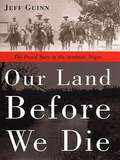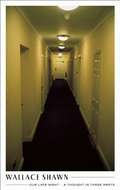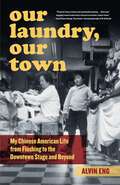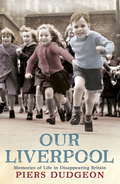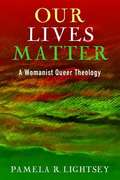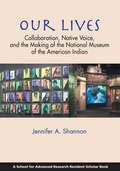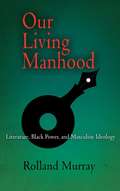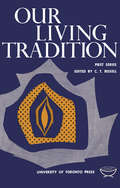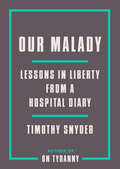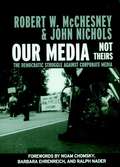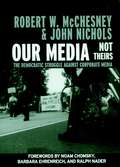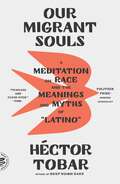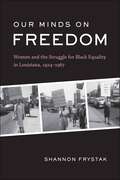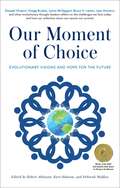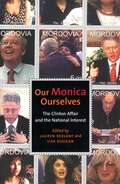- Table View
- List View
Our Ice Is Vanishing / Sikuvut Nunguliqtuq: A History of Inuit, Newcomers, and Climate Change (McGill-Queen's Indigenous and Northern Studies)
by Shelley WrightThe Arctic is ruled by ice. For Inuit, it is a highway, a hunting ground, and the platform on which life is lived. While the international community argues about sovereignty, security, and resource development at the top of the world, the Inuit remind us that they are the original inhabitants of this magnificent place - and that it is undergoing a dangerous transformation. The Arctic ice is melting at an alarming rate and Inuit have become the direct witnesses and messengers of climate change. Through an examination of Inuit history and culture, alongside the experiences of newcomers to the Arctic seeking land, wealth, adventure, and power, Our Ice Is Vanishing describes the legacies of exploration, intervention, and resilience. Combining scientific and legal information with political and individual perspectives, Shelley Wright follows the history of the Canadian presence in the Arctic and shares her own journey in recollections and photographs, presenting the far North as few people have seen it. Climate change is redrawing the boundaries of what Inuit and non-Inuit have learned to expect from our world. Our Ice Is Vanishing demonstrates that we must engage with the knowledge of the Inuit in order to understand and negotiate issues of climate change and sovereignty claims in the region.
Our Indigenous Ancestors: A Cultural History of Museums, Science, and Identity in Argentina, 1877–1943
by Carolyne R. LarsonOur Indigenous Ancestors complicates the history of the erasure of native cultures and the perceived domination of white, European heritage in Argentina through a study of anthropology museums in the late nineteenth and early twentieth centuries. Carolyne Larson demonstrates how scientists, collectors, the press, and the public engaged with Argentina’s native American artifacts and remains (and sometimes living peoples) in the process of constructing an “authentic” national heritage. She explores the founding and functioning of three museums in Argentina, as well as the origins and consolidation of Argentine archaeology and the professional lives of a handful of dynamic curators and archaeologists, using these institutions and individuals as a window onto nation building, modernization, urban-rural tensions, and problems of race and ethnicity in turn-of-the-century Argentina. Museums and archaeology, she argues, allowed Argentine elites to build a modern national identity distinct from the country’s indigenous past, even as it rested on a celebrated, extinct version of that past. As Larson shows, contrary to widespread belief, elements of Argentina’s native American past were reshaped and integrated into the construction of Argentine national identity as white and European at the turn of the century. Our Indigenous Ancestors provides a unique look at the folklore movement, nation building, science, institutional change, and the divide between elite, scientific, and popular culture in Argentina and the Americas at a time of rapid, sweeping changes in Latin American culture and society.
Our Intellectual Strength and Weakness: 'English-Canadian Literature' and 'French-Canadian Literature'
by Thomas Guthrie Marquis Clara Thomas Douglas Lochhead John George Bourinot Camille RoyThese three works, displaying marked differences in purpose, tone, and effect, are all classics of Canadian literary and cultural criticism.John George Bourinot was a man of letters, an Imperialist, and a biculturalist, who was confident of his knowledge of the Canadian identity and felt it to be his public mission to align reality with his own personal vision. Writing in 1893 to the élite represented by the members of the Royal Society, he described his work as 'a monograph on the intellectual development of the Dominion,' describing 'the progress of culture in a country still struggling with the difficulties of the material development of half a continent.'Two decades later, Thomas Guthrie Marquis and Camille Roy wrote what were, in contrast, specialized assignments, contributions to the compendium history, Canada and Its Provinces (1913). Addressing a far larger audience, and treating a vastly enlarged body of Canadian literature, their work comes much closer to contemporary scholarship, with greater clarity, organization, and sheer bulk of information, but with the loss of some of the charm and assurance of Bourinot's wide sweep. In further contrast to Bourinot's determined biculturalism and will to unity, Roy and Marquis' essays display vivid differences in the emotional allegiances and convictions of the founding cultures. Marquis starts by asking the question, 'Has Canada a voice of her own in literature distinct from that of England?'; Roy treats French-Canadian literature in its Roman Catholic contexts.
Our Jackie: Public Claims on a Private Life
by Karen M. DunakTells the story of Jacqueline Kennedy Onassis through her evolving public persona, from campaign wife to First Lady to fallen idol to treasured national iconWhen Jacqueline Kennedy Onassis became First Lady of the United States over sixty years ago, she stepped into the public spotlight. Although Jackie is perhaps best known for her two highly-publicized marriages, her legacy has endured beyond twentieth-century pop culture and she remains an object of public fascination today.Drawing on a range of sources– from articles penned for the women’s pages of local newspapers, to esteemed national periodicals, to fan magazines and film– Our Jackie evaluates how media coverage of Jacqueline Kennedy Onassis changed over the course of her very public life. Jackie’s interactions with and framing by the American media reflect the changing attitudes toward American womanhood. Over the course of four decades, Jackie was alternatively praised for her service to others, and pilloried for her perceived self-interest. In Our Jackie, Karen M. Dunak argues that whether she was portrayed as a campaign wife, a loyal widow, a selfish jetsetter, or a mature career woman, the history of Jackie’s highly publicized life demonstrates the ways in which news, entertainment, politics, and celebrity evolved and intertwined over the second half of the twentieth century.Examining the intimate chronicles of this famous First Lady’s life, Our Jackie suggests that media coverage of this enigmatic public figure revealed as much about the prevailing views of women in America– how they should behave and whom they should serve– as it did about Jacqueline Kennedy Onassis as an individual.
Our Kind of People: Inside America's Black Upper Class
by Lawrence Otis GrahamDebutante cotillions. Million-dollar homes. Summers in Martha's Vineyard. Membership in the Links, Jack & Jill, Deltas, Boule, and AKAs. An obsession with the right schools, families, social clubs, and skin complexion. This is the world of the black upper class and the focus of the first book written about the black elite by a member of this hard-to-penetrate group.Author and TV commentator Lawrence Otis Graham, one of the nation's most prominent spokesmen on race and class, spent six years interviewing the wealthiest black families in America. He includes historical photos of a people that made their first millions in the 1870s. Graham tells who's in and who's not in the group today with separate chapters on the elite in New York, Los Angeles, Washington, Chicago, Detroit, Memphis, Atlanta, Philadelphia, Nashville, and New Orleans. A new Introduction explains the controversy that the book elicited from both the black and white communities.
Our Kind of People: Thoughts on the HIV/AIDS epidemic
by Uzodinma IwealaHIV/AIDS is more divisive and destructive than any other disease - tearing apart communities and ostracising the afflicted. Award-winning novelist Uzodinma Iweala embarks on a remarkable journey around the African continent meeting individuals and communities that are struggling daily with the disease. He meets people from all walks of life, from sex workers to the truck drivers who frequent them; from the doctors and nurses who tend the sick; to the children orphaned by the illness and their adoptive families. He meets the wives of husbands with HIV and the husbands of wives with the virus. Beautifully written and heart-breakingly honest, Our Kind of People goes behind the headlines of this epidemic to show the real lives affected by it, illuminating the scope of the crisis and a continent's desperate struggle.
Our Kindred Creatures: How Americans Came to Feel the Way They Do About Animals
by Monica Murphy Bill WasikA compassionate, sweeping history of the transformation in American attitudes toward animals by the best-selling authors of RabidOver just a few decades at the end of the nineteenth century, the United States underwent a moral revolution on behalf of animals. Before the Civil War, animals' suffering had rarely been discussed; horses pulling carriages and carts were routinely beaten in public view, and dogs were pitted against each other for entertainment and gambling. But in 1866, a group of activists began a dramatic campaign to change the nation&’s laws and norms, and by the century&’s end, most Americans had adopted a very different way of thinking and feeling about the animals in their midst.In Our Kindred Creatures, Bill Wasik, editorial director of The New York Times Magazine, and veterinarian Monica Murphy offer a fascinating history of this crusade and the battles it sparked in American life. On the side of reform were such leaders as George Angell, the inspirational head of Massachusetts&’s animal-welfare society and the American publisher of the novel Black Beauty; Henry Bergh, founder of the American Society for the Prevention of Cruelty to Animals; Caroline White of Philadelphia, who fought against medical experiments that used live animals; and many more, including some of the nation&’s earliest veterinarians and conservationists. Caught in the movement&’s crosshairs were transformational figures in their own right: animal impresarios such as P. T. Barnum, industrial meat barons such as Philip D. Armour, and the nation&’s rising medical establishment, all of whom put forward their own, very different sets of modern norms about how animals should be treated.In recounting this remarkable period of moral transition—which, by the turn of the twentieth century, would give birth to the attitudes we hold toward animals today—Wasik and Murphy challenge us to consider the obligations we still have to all our kindred creatures.
Our Lady of Guadalupe
by Jeanette RodriguezOur Lady of Guadalupe is the most important religious symbol of Mexico and one of the most powerful female icons of Mexican culture. In this study, based on research done among second-generation Mexican-American women, Rodriguez examines the role the symbol of Guadalupe has played in the development of these women. She goes beyond the thematic and religious implications of the symbol to delve into its relevance to their daily lives. Rodriguez's study offers an important reinterpretation of one of the New World's most potent symbols. Her conclusions dispute the common perception that Guadalupe is a model of servility and suffering. Rather, she reinterprets the symbol of Guadalupe as a liberating and empowering catalyst for Mexican-American women.
Our Land Before We Die
by Jeff GuinnIn Our Land Before We Die, Jeff Guinn traces the little-known history of the runaway slaves who fled to the Florida Everglades to live alongside the Seminole Indians. Deeply rooted in tribal oral history, and based on extensive interviews with descendants, this book describes the incredible circumstances of a people who sought shelter in the shadow of a tribe whose land and welfare already hung in the balance. And yet, in their tireless journey-from Florida to Indian Territory in Oklahoma; on the seven-hundred-mile flight from persecution that took them across the Rio Grande into Mexico; and then back across the Rio Grande to Texas-they never surrendered the hope of one day attaining land of their own. Our Land Before We Die brings to life the largely forgotten history of a courageous people and the descendants for whom this story is their only legacy.
Our Late Night and A Thought in Three Parts
by Wallace Shawn"[Our Late Night is] a short play, but a savage one...Neurosis, panic and sexual surreality underlie Shawn's startling vision of New Yorkers at play."--GuardianWallace Shawn's OBIE Award-winning, never before published Our Late Night premiered in New York in 1975 under direction of André Gregory, and was revived in London in 1999 under direction of Caryl Churchill. A Thought in Three Parts--currently out of print--created an uproar with its 1977 London premiere, investigated by the vice squad for its allegedly pornographic content. Wallace Shawn is a noted actor and writer. His politically charged and controversial plays include Aunt Dan and Lemon, The Designated Mourner, and The Fever.
Our Laundry, Our Town: My Chinese American Life from Flushing to the Downtown Stage and Beyond
by Alvin EngWith humor and grace, the memoir of a first-generation Chinese American in New York City.Our Laundry, Our Town is a memoir that decodes and processes the fractured urban oracle bones of Alvin Eng’s upbringing in Flushing, Queens, in the 1970s. Back then, his family was one of the few immigrant Chinese families in a far-flung neighborhood in New York City. His parents had an arranged marriage and ran a Chinese hand laundry. From behind the counter of his parents’ laundry and within the confines of a household that was rooted in a different century and culture, he sought to reconcile this insular home life with the turbulent yet inspiring street life that was all around them––from the faux martial arts of TV’s Kung Fu to the burgeoning underworld of the punk rock scene.In the 1970s, NYC, like most of the world, was in the throes of regenerating itself in the wake of major social and cultural changes resulting from the counterculture and civil rights movements. And by the 1980s, Flushing had become NYC’s second Chinatown. But Eng remained one of the neighborhood’s few Chinese citizens who did not speak fluent Chinese. Finding his way in the downtown theater and performance world of Manhattan, he discovered the under-chronicled Chinese influence on Thornton Wilder’s foundational Americana drama, Our Town. This discovery became the unlikely catalyst for a psyche-healing pilgrimage to Hong Kong and Guangzhou, China—his ancestral home in southern China—that led to writing and performing his successful autobiographical monologue, The Last Emperor of Flushing. Learning to tell his own story on stages around the world was what proudly made him whole.As cities, classrooms, cultures, and communities the world over continue to re-examine the parameters of diversity, equity, and inclusion, Our Laundry, Our Town will reverberate with a broad readership.
Our Law Enforcement Center (Places in Our Community)
by Mary MeinkingThe law enforcement center is an important part of our community. Many community helpers work together at a law enforcement center. Readers will learn about who works at a law enforcement center, what the workers do, and what makes a law enforcement center special. Simple, at-level text and vibrant photos help readers learn all about this vital community building.
Our Library (Places in Our Community)
by Lisa J. AmstutzThe library is a very important place in our community! Lots of community helpers work at libraries. Readers will learn about who works at a library, what the workers do, and what makes a library special. Simple, at-level text and vibrant photos help readers learn all about libraries in the community.
Our Liverpool: Memories of Life in Disappearing Britain
by Piers DudgeonThis ebook edition contains the full text version as per the book. Doesn't include original photographic and illustrated material. OUR LIVERPOOL is an oral history about the real Liverpool - about the city before its slick transformation to European City of Culture and about the spirit that remains at its heart. Here, at last, is Liverpool's grievous and glorious past. And here, through the people's voices, we find old Liverpool, without the gift-wrap. Its stories pulsate with the rhythms of an alternately funny, flippant, belligerent, stubborn and warm heart, and they broadcast the values of a community, which are the city's true legacy to the modern world. Piers Dudgeon has listened to dozens of people who remember the city as it was, and who have lived through its many changes. They talk of childhood and education, of work and entertainment, of family, community values, health, politics, religion and music. Their stories will make you laugh and cry. It is people's own memories that make history real and this engrossing book captures them vividly.
Our Lives Matter: A Womanist Queer Theology
by Pamela R. LightseyOur Lives Matter uses the tenor of the 2014 national protests that emerged as a response to excessive police force against Black people to frame the book as following the discursive tradition of liberation theologies broadly speaking and womanist theology specifically. Using a womanist methodological approach, Pamela R. Lightsey helps readers explore the impact of oppression against Black LBTQ women while introducing them to the emergent intellectual movement known as queer theology. The author privileges their narratives and experiences as she reviews several doctrines and dogma of the Christian church. Theological reflection on contemporary debates such as same-sex marriage and ordination rights make this book a valuable resource to clergy, students of theology, LGBTQ persons and allies.
Our Lives: Collaboration, Native Voice, and the Making of the National Museum of the American Indian
by Jennifer A. ShannonIn 2004 the National Museum of the American Indian (NMAI) opened to the general public. This book, in the broadest sense, is about how that museum became what it is today. For many Native individuals, the NMAI, a prominent and permanent symbol of Native presence in America, in the shadow of the Capitol and at the center of federal power, is a triumph. At the grand opening, the museum's main message was "We are still here." This message was most directly displayed in Our Lives: Contemporary Life and Identities, one of the NMAI's inaugural exhibitions and the main focus of this book. Ultimately, this is a record of the sincere efforts--and conflicts and achievements--experienced by those who planned, developed, and constructed the NMAI's inaugural exhibitions. It is a narrowly focused account of a particular kind of curatorial practice called "community curating." It is also an account of many different people struggling to do their best under the weight of a monumental task: to represent all Native peoples of the Americas in the first institution of its kind, a national museum dedicated to the first peoples of the hemisphere.
Our Living Manhood
by Rolland MurrayWhen Eldridge Cleaver wrote in 1965 that black men "shall have our manhood or the earth will be leveled by our attempt to gain it," he voiced a central strain of Black Power movement rhetoric. In print, as well as on stage and screen, Black Power advocates equated masculinity with their political radicalism and potency. While many observers have criticized the misogyny in this preoccupation, few have noted the challenges to it within the period in the works of authors such as James Baldwin, John Edgar Wideman, Clarence Major, and John Oliver Killens. These and other writers tested the link between masculinity and radical politics. By recovering their voices, Rolland Murray demonstrates that the movement's gender ideals were questioned more fully than scholars have acknowledged. He also examines how the Black Power era's contentious gender politics continue to play a role in contemporary African American culture and scholarship. Murray analyzes the ways in which notions of masculinity were interwoven with essential movement philosophies regarding revolutionary violence, charismatic leadership, radical rhetoric, and black sexuality. Striving to forge a more nuanced account of how masculinist discourse contributed to the movement's overall agenda, he frames masculinity both as a linchpin of the seductive politics of Black Power and as a focal point of dissent by black male authors.
Our Living Tradition: First Series
by Claude BissellIn this book, seven distinguished scholars and writers discuss seven leading figures in the history of Canadian letters and public affairs. Frank H. Underhill, historian, describes the tragic career of Edward Blake, one of the ablest men who ever entered Canadian politics. D.G. Creighton, author of the definitive biography of Sir John A. Macdonald, writes of this politician whose solid achievements mock the facile depreciations of his character current during his lifetime and after. Mason Wade, author of The French-Canadians, describes the career of Sir Wilfrid Laurier, who pledged as a law student, "I will give the whole of my life to the cause of conciliation, harmony, and concord among the different elements of his country of ours."Robertson Davies, playwright, author, and critic, writes with penetration and sympathy of Stephen Leacock, the humorist; Munro Beattie, professor of English, of Archibald Lampman's poetry, particularly as related to Ottawa, the city in which he lived and wrote; Wilfrid Eggleston, journalist and poet, of Frederick Philip Grove, "the first serious exponent of realism in our fiction." Malcolm Ross, professor of English, editor, and critic tells of Goldwin Smith, that complex and contradictory figure---the architect of "Canada First," who yet "had no sense whatever of the national feeling of born Canadians."
Our Malady: Lessons in Liberty from a Hospital Diary
by Timothy SnyderOn December 29, 2019, historian Timothy Snyder fell gravely ill. Unable to stand, barely able to think, he waited for hours in an emergency room before being correctly diagnosed and rushed into surgery. Over the next few days, as he clung to life and the first light of a new year came through his window, he found himself reflecting on the fragility of health, not recognized in America as a human right but without which all rights and freedoms have no meaning. <p><p> And that was before the pandemic. We have since watched American hospitals, long understaffed and undersupplied, buckling under waves of coronavirus patients. The federal government made matters worse through willful ignorance, misinformation, and profiteering. Our system of commercial medicine failed the ultimate test, and thousands of Americans died. <p> In this eye-opening cri de coeur, Snyder traces the societal forces that led us here and outlines the lessons we must learn to survive. In examining some of the darkest moments of recent history and of his own life, Snyder finds glimmers of hope and principles that could lead us out of our current malaise. Only by enshrining healthcare as a human right, elevating the authority of doctors and medical knowledge, and planning for our children’s future can we create an America where everyone is truly free. <p> <b>A New York Times Bestseller</b>
Our Media, Not Theirs (The Democratic Struggle Against Corporate Media)
by Robert W. Mcchesney John NicholsMcChesney and Nichols provide much evidence that we may be in 'the early stages of a serious social movement,' for which democratization of the media will be a central focus of discussion, activism, and reconstruction. They make a powerful case in support of these priorities, and suggest paths that can be followed to lay these foundations for recovering rights, and carrying forward the endless struggle for freedom and justice.
Our Media, Not Theirs: The Democratic Struggle Against Corporate Media (Open Media Series)
by Noam Chomsky Robert W. Mcchesney John Nichols Barbara Ehrenreich Ralph NaderOur Media, Not Theirs! The Democratic Struggle Against Corporate Media examines how the current media system in the United States undermines democracy, and what we can do to change it. McChesney and Nichols begin by detailing how the media system has come to be dominated by a handful of transnational conglomerates that use their immense political and economic power to saturate the population with commercial messages. Further, the authors provide an analysis of the burgeoning media reform activities in the United States, and outline ways we can structurally change the media system through coalition work and movement-building: the tools we need in order to battle for a better media.
Our Migrant Souls: A Meditation on Race and the Meanings and Myths of “Latino”
by Héctor TobarWINNER OF THE KIRKUS PRIZE FOR NONFICTIONNamed One of The New York Times’ 100 Notable Books of 2023One of Time’s 100 Must-Read Books of 2023 | A Top Ten Book of 2023 at Chicago Public LibraryA new book by the Pulitzer Prize–winning writer about the twenty-first-century Latino experience and identity.In Our Migrant Souls, the Pulitzer Prize–winning writer Héctor Tobar delivers a definitive and personal exploration of what it means to be Latino in the United States right now.“Latino” is the most open-ended and loosely defined of the major race categories in the United States, and also one of the most rapidly growing. Composed as a direct address to the young people who identify or have been classified as “Latino,” Our Migrant Souls is the first account of the historical and social forces that define Latino identity.Taking on the impacts of colonialism, public policy, immigration, media, and pop culture, Our Migrant Souls decodes the meaning of “Latino” as a racial and ethnic identity in the modern United States, and gives voice to the anger and the hopes of young Latino people who have seen Latinidad transformed into hateful tropes and who have faced insult and division—a story as old as this country itself.Tobar translates his experience as not only a journalist and novelist but also a mentor, a leader, and an educator. He interweaves his own story, and that of his parents’ migration to the United States from Guatemala, into his account of his journey across the country to uncover something expansive, inspiring, true, and alive about the meaning of “Latino” in the twenty-first century.A new book by the Pulitzer Prize–winning writer about the twenty-first-century Latino experience and identity.In Our Migrant Souls, the Pulitzer Prize–winning writer Héctor Tobar delivers a definitive and personal exploration of what it means to be Latino in the United States right now. “Latino” is the most open-ended and loosely defined of the major race categories in the United States, and also one of the most rapidly growing. Composed as a direct address to the young people who identify or have been classified as “Latino,” Our Migrant Souls is the first account of the historical and social forces that define Latino identity.Taking on the impacts of colonialism, public policy, immigration, media, and pop culture, Our Migrant Souls decodes the meaning of “Latino” as a racial and ethnic identity in the modern United States, and gives voice to the anger and the hopes of young Latino people who have seen Latinidad transformed into hateful tropes and who have faced insult and division—a story as old as this country itself. Tobar translates his experience as not only a journalist and novelist but also a mentor, a leader, and an educator. He interweaves his own story, and that of his parents’ migration to the United States from Guatemala, into his account of his journey across the country to uncover something expansive, inspiring, true, and alive about the meaning of “Latino” in the twenty-first century.
Our Minds on Freedom: Women and the Struggle for Black Equality in Louisiana, 1924-1967 (Library of Southern Civilization)
by Shannon FrystakTraditionally, literature on the civil rights movement has highlighted the leadership of ministerial men and young black revolutionaries like the Reverend Martin Luther King, Jr., Stokely Carmichael, and Malcolm X. Though recent studies have begun to explore female participation in the struggle for racial justice, women have generally been relegated to the margins of civil rights history. In Our Minds on Freedom, Shannon Frystak explores the organizational and leadership roles female civil rights activists in Louisiana assumed from the 1920s to the 1960s, highlighting a diverse group of courageous women who fought alongside their brothers and fathers, uncles and cousins, to achieve a more racially just Louisiana.From the Depression through World War II and the postwar years, Frystak shows, black women joined and led local unions and civil rights organizations, agitating for voting rights and equal treatment in the public arena, in employment, and in admission to Louisiana's institutions of higher learning. At the same time, black women and white women began to find common ground in organizations such as the YWCA, the NAACP, and the National Urban League. Frystak explores how women of both races worked together to organize the 1953 Baton Rouge bus boycott, which served as inspiration for the more famous Montgomery bus boycott two years later;in the day-to-day struggle to alter the system of unequal education throughout the state; and in the fight to integrate New Orleans schools after the 1954 Brown decision.In the early 1960s, a new generation of female activists joined their older female counterparts to work with organizations such as the NAACP, the Congress of Racial Equality (CORE), and a number of local grassroots civil rights organizations. Frystak vividly describes the very real dangers they faced canvassing for voter registration in Louisiana's rural areas, teaching in Freedom Schools, and hosting out-of-town civil rights workers in their homes.As Frystak shows, the civil rights movement allowed women to step out of their socially prescribed roles as wives, mothers, and daughters and become significant actors, indeed leaders, in a social movement structure largely dominated by men. Our Minds on Freedom is a welcome addition to the literature of the civil rights movement and will intrigue those interested in African American history, women's history, Louisiana, or the U.S. South.
Our Moment of Choice: Evolutionary Visions and Hope for the Future
by Robert Atkinson Kurt Johnson Deborah MoldowWINNER OF THE 2020 GOLD NAUTILUS BOOK AWARD * 2021 SILVER COVR VISIONARY AWARD * 2021 NEW YORK BOOK FESTIVAL AWARD * 2021 GOLD LIVING NOW AWARD This timely and compelling anthology is a rousing call-to-action for all of us to help transform the world into a just, peaceful, and thriving one—featuring creative and practical solutions to the many crises facing humanity today.Humanity is currently facing a series of interconnected emergencies that threaten our very survival—from climate change to economic inequality and beyond. And yet, at the same time, a global shift towards harnessing our collective power to create a life-affirming future is flourishing. Featuring chapters by forty-three leading-edge contributors, such as Gregg Braden, Lynne McTaggart, Bruce Lipton, Jean Houston, Michael Bernard Beckwith, Ervin Laszlo, Joan Borysenko, Larry Dossey, and many more, Our Moment of Choice provides eye-opening and inspirational visions for a unified, peaceful, and thriving world. The time has come for all humanity to be united in purpose. This is our collective moment of choice, upon which our future depends.
Our Monica, Ourselves: The Clinton Affair and the National Interest (Sexual Cultures #37)
by Lisa Duggan Lauren BerlantAlongside the O.J. Simpson trial, the affair between Bill Clinton and Monica Lewinsky now stands as the seminal cultural event of the 90s. Alternatively transfixed and repelled by this sexual scandal, confusion still reigns over its meanings and implications. How are we to make sense of a tale that is often wild and bizarre, yet replete with serious political and cultural implications? Our Monica, Ourselves provides a forum for thinking through the cultural, political, and public policy issues raised by the investigation, publicity, and Congressional impeachment proceedings surrounding the affair. It pulls this spectacle out of the framework provided by the conventions of the corporate news media, with its particular notions of what constitutes a newsworthy event. Drawing from a broad range of scholars, Our Monica, Ourselves considers Monica Lewinsky's Jewishness, Linda Tripp's face, the President's penis, the role of shame in public discourse, and what it's like to have sex as the president, as well as specific legal and historical issues at stake in the impeachment of Bill Clinton. Thoughtful but accessible, immediate yet far reaching, Our Monica, Ourselves will change the way we think about the Clinton affair, while helping us reimagine culture and politics writ large. Contributors include: Lauren Berlant, Eric O. Clarke, Ann Cvetkovich, Simone Weil Davis, Lisa Duggan, Jane Gallop, Marjorie Garber, Janet R. Jakobsen, James R. Kincaid, Laura Kipnis, Tomasz Kitlinski, Pawel Leszkowicz, Joe Lockard, Catharine Lumby, Toby Miller, Dana D. Nelson, Anna Marie Smith, Ellen Willis, and Eli Zaretsky.
